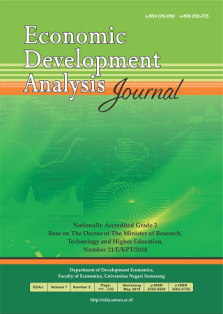Does Monetary Transmission Effective? Evidence from Indonesia
Abstract
This study aims to examine the effects of monetary policy in Indonesia on real variables represented by output and nominal variables represented by inflation. This research is based on an autoregressive distributed model (ARDL) approach which includes lag for the dependent variable and its explanatory variables as regressors. So it is appropriate to analyze time-series data dynamically. Monetary policy variables include deposit interest rate, lending interest rate, asset/stock price, and exchange rate. The results show that the deposit interest rate has a negative effect on inflation in the short run, meanwhile, the lending interest rate has a negative effect on inflation in the long run. Also, the lending interest rate has an effective effect on output in the short run. This study also proves that stock price has a positive effect on the monetary transmission to inflation. This is an important finding considering that the value of assets and individual wealth can affect aggregate demand. These findings have implications for the importance of monetary policy as a policy of stabilizing inflation and output in the short run and stabilizing inflation in the long run by emphasizing the interest rate channel, in addition to seeing the importance of the asset price channel.


